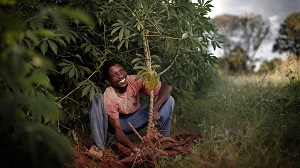Investments in fledgling seed companies could drive East African food output
Posted on : Wednesday , 20th August 2014

Locally-owned African seed companies participating in a programme to offer high-yield crop varieties to smallholder farmers across the continent have collectively become the largest seed producers in South & East Africa.
“The rapid growth of local seed companies over a very short time period is a testament to the entrepreneurial spirit percolating in communities across Africa and to the pent-up demand among Africa’s smallholder farmers for improved, high-yield crop varieties,” commented AGRA Programme for Africa’s Seed Systems (PASS) director Dr Joe DeVries.
AGRA launched PASS in 2007 to inject new energy into Africa’s commercial seed sector, which was failing to provide African farmers with a steady supply of locally adapted, improved crop varieties.
The organisation said the stagnant state of commercial seed production was often cited as a key reason that the volumes of staple crop yields in Africa were up to 80% lower than that achieved by farmers elsewhere in the world.
According to the report, ‘Planting the Seeds of a Green Revolution in Africa’, PASS, currently partnered with some 80 companies across the continent which produced professionally certified seed for an array of African staple crops, including maize, cassava, millet, rice, sorghum, beans, sweet potato, cowpea, groundnut, soybean and pigeon pea.
These companies focused on varieties selected by local crop breeders for their compatibility with specific African agricultural environments
“There are already indications that increasing access to the improved seed is helping farmers coax more food out of the same amount of land. A 2013 survey of farmers in nine countries found that the majority of farmers who have invested in improved crop varieties have seen yields rise by between 50% and 100%,” said DeVries.
Moreover, AGRA maintained that some 69% of farmers surveyed in Kenya, 74% in Nigeria, and 79% in Mozambique & Tanzania had said improved maize varieties had allowed them to double the amount of maize harvested per hectare.
Similarly, 79% of farmers surveyed in Ghana reported doubling rice yields, while 85% of farmers surveyed in Uganda reported doubling yields from cowpea.
The analysis of AGRA’s seed programme further noted that several “successes” could be attributed to a strategy focused on addressing weak links across what agriculture experts call the seed “value chain” – particularly related to education, breeding, production, and distribution.
Publicly funded crop breeding programmes supported by AGRA since 2007 had released 464 new varieties of 15 important crop species developed for specific African climates and soils.
Through public–private partnerships with seed companies, more than 300 of these new varieties were already available to farmers.
SEED ACCESS
The report also identified challenges to ensuring that the majority of smallholder farmers in Africa had access to improved crop varieties and to the fertilisers and other inputs required to achieve their full yield potential.
“For example, national governments need to free up the supply of foundation seed developed by their public-sector breeding programmes and offer tax incentives to encourage investments in processing equipment, irrigation technology and other seed production infrastructure.
“Also, local seed companies need more access to investment capital and farmers need to learn more about the benefits of investing in [high-]quality seed of superior varieties,” it noted.
Meanwhile, donor countries were increasingly viewing agriculture as the key to alleviating poverty in Africa.
AGRA stated that “major” new initiatives were being launched, such as the New Alliance for Food Security – a shared commitment of African leaders, private-sector partners and donor governments to lift millions out of poverty over the next decade.
As part of that initiative, AGRA, with support from Feed the Future through the United States Agency for International Development, was accelerating the adoption of high-yield crop varieties and complementary technologies by smallholder farmers in Africa through the Scaling Seeds and Technologies Partnership (SSTP), a $47-million effort in Ethiopia, Ghana, Malawi, Mozambique, Senegal and Tanzania.
“It’s clear that increasing incomes for small farms, and for the local businesses that supply them, is the key to prosperity for millions of people living in sub-Sahara Africa,” said SSTP chief of party at AGRA Dr Richard Jones.
“Now we’re building on that success by working with the private sector and governments to form country-led initiatives that will substantially increase and maintain the development, production and distribution of [high-]quality seed of superior varieties.”
GROWTH DRIVER
AGRA asserted that the discussion at the WEF on Africa on the benefits gained from investments in local seed production occurred at a time when agriculture was seen as the “engine” that could drive economic growth across the continent.
This was, however, coupled with concerns that rapid growth could marginalise smallholder farmers and local agriculture businesses.
As such, AGRA insisted that the focus had to remain on boosting the production of smallholder farms and nurturing local agriculture-related enterprises.
“When we talk about a unique green revolution for Africa, we are talking about something that is indeed revolutionary, which is the development of a modern, highly-productive agriculture sector that remains focused on small, family farms,” commented AGRA presidentJane Karuku.
“Our seed programme has shown that, if given access to the essential ingredients of modern agriculture, smallholder farmers in Africa can rapidly increase food production and become the bedrock of food security for the continent,” she noted.
Source : www.engineeringnews.co.za


